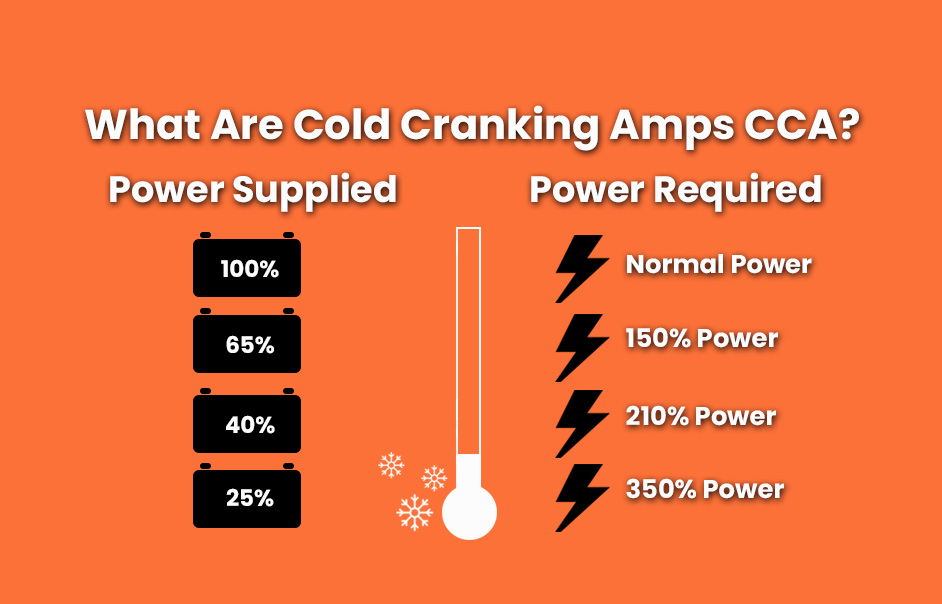What Are Cold Cranking Amps (CCA)?
When it comes to the performance of your vehicle's battery, especially during cold weather, the term "Cold Cranking Amps" (CCA) holds significant importance. As a car owner, understanding what CCA is and its implications on your vehicle's battery health is essential for ensuring smooth operation, particularly during chilly mornings.

Introduction to Cold Cranking Amps (CCA)
If you wonder What Are Cold Cranking Amps (CCA)? Cold Cranking Amps (CCA) is a measurement used to determine a battery's ability to start an engine in cold temperatures. Essentially, it measures the number of amps a battery can deliver at 0°F (-18°C) for 30 seconds while maintaining a voltage of at least 7.2 volts. This parameter is crucial because cold weather can significantly reduce a battery's ability to deliver power effectively, making it harder for the engine to start.
Understanding the importance of CCA in car batteries
The significance of CCA becomes apparent during cold weather conditions when the engine requires more power to start due to increased viscosity of engine oil and other fluids. A battery with a higher CCA rating can deliver more power in such conditions, ensuring reliable engine starts even in freezing temperatures.
How CCA is measured
CCA testing standards
CCA is determined through standardized testing procedures set by organizations such as the Society of Automotive Engineers (SAE). These tests involve subjecting the battery to specific temperature conditions and measuring its performance under load.
Impact of temperature on CCA
It's essential to note that CCA values are temperature-dependent. As the temperature drops, the battery's ability to deliver power decreases, necessitating higher CCA ratings for reliable performance in colder climates.
Factors affecting CCA
Several factors can influence a battery's CCA rating:
Battery age and condition
As batteries age, their internal components degrade, leading to a decrease in CCA. Regular maintenance and timely replacement of old batteries are crucial for maintaining optimal CCA levels.
Battery size and capacity
Larger batteries typically have higher CCA ratings due to their increased capacity to deliver power. However, it's essential to ensure that the battery size matches the vehicle's specifications to avoid compatibility issues.
Choosing the right CCA for your vehicle
Selecting the appropriate CCA rating for your vehicle involves considering various factors:
Considering climate conditions
If you live in an area with harsh winters, opting for a battery with a higher CCA rating is advisable to ensure reliable starts in cold weather.
Consulting your vehicle manual
Vehicle manufacturers often provide recommendations regarding the ideal CCA rating for specific models. Referencing your vehicle manual can help you determine the suitable CCA for your car.
Seeking professional advice
If you're unsure about which CCA rating is best for your vehicle, consulting with a qualified mechanic or battery specialist can provide valuable insights and recommendations.
Common misconceptions about CCA
Despite its importance, there are some misconceptions surrounding CCA:
Higher CCA is always better
While a higher CCA rating generally indicates better cold-weather performance, it's essential to strike a balance between CCA and other factors such as battery size and capacity. Choosing a battery solely based on its CCA rating may not always be the most optimal decision.
CCA is the only factor to consider
While CCA is crucial, it's just one of several factors to consider when selecting a car battery. Factors such as reserve capacity, warranty, and brand reputation should also be taken into account to ensure overall battery reliability and longevity.
Conclusion
Understanding the significance of Cold Cranking Amps (CCA) is essential for maintaining reliable vehicle performance, particularly in cold weather conditions. By choosing the right battery with an appropriate CCA rating and addressing other factors affecting battery health, car owners can ensure smooth engine starts and prolonged battery life.
FAQs
- What is the ideal CCA rating for my vehicle?
- The ideal CCA rating varies depending on factors such as climate, vehicle model, and engine size. Referencing your vehicle manual or consulting with a professional can help determine the appropriate CCA for your car.
- The ideal CCA rating varies depending on factors such as climate, vehicle model, and engine size. Referencing your vehicle manual or consulting with a professional can help determine the appropriate CCA for your car.
- Can I install a battery with a higher CCA rating than recommended?
- While installing a battery with a higher CCA rating can provide additional cold-weather performance, it's essential to ensure compatibility with your vehicle's electrical system and specifications.
- While installing a battery with a higher CCA rating can provide additional cold-weather performance, it's essential to ensure compatibility with your vehicle's electrical system and specifications.
- Do all batteries undergo the same CCA testing standards?
- CCA testing standards may vary between battery manufacturers, but most adhere to standardized procedures set by organizations such as the Society of Automotive Engineers (SAE) to ensure consistency and accuracy.
- CCA testing standards may vary between battery manufacturers, but most adhere to standardized procedures set by organizations such as the Society of Automotive Engineers (SAE) to ensure consistency and accuracy.
- What should I do if my vehicle struggles to start in cold weather despite having a high CCA battery?
- In addition to CCA, other factors such as battery age, condition, and electrical system health can affect cold-weather performance. It's advisable to have your vehicle inspected by a qualified mechanic to identify and address any underlying issues.
- In addition to CCA, other factors such as battery age, condition, and electrical system health can affect cold-weather performance. It's advisable to have your vehicle inspected by a qualified mechanic to identify and address any underlying issues.
- Can I increase my vehicle's CCA by adding additional batteries?
- While adding extra batteries may increase overall power capacity, it's essential to ensure proper installation and compatibility with your vehicle's electrical system. Consulting with a professional is recommended before modifying your vehicle's battery setup.
